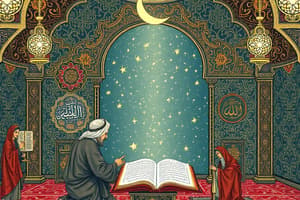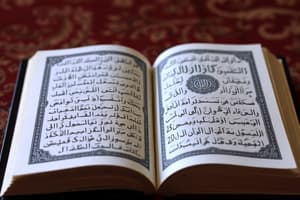Podcast
Questions and Answers
What was the significance of the Battle of Badr in early Islam?
What was the significance of the Battle of Badr in early Islam?
- It was a major military victory for the outnumbered Muslims, strengthening their belief that God was on their side. (correct)
- It led to the immediate conversion of the Meccans to Islam, unifying Arabia under a single faith.
- It marked the end of the conflict between Muslims and Meccans, leading to lasting peace.
- It resulted in the exile of Muhammad and his followers from Mecca, initiating a period of hardship.
Which of the following best describes the role of the Quran in Islam?
Which of the following best describes the role of the Quran in Islam?
- A collection of poetry and stories that provide moral guidance, but not considered divine.
- A historical account of Muhammad's life, which serves as a secondary source of Islamic law.
- The final and ultimate authority and sacred text, believed to be the words of Allah revealed to Muhammad. (correct)
- A compilation of interpretations and commentaries by Islamic scholars throughout history.
Why was the city of Baghdad significant during the Abbasid Caliphate?
Why was the city of Baghdad significant during the Abbasid Caliphate?
- It became a central hub of learning and scholarship, attracting intellectuals from various cultures. (correct)
- It was mainly a commercial center focused on maritime trade and economic exchange.
- It served as a neutral meeting ground for various religious scholars to promote interfaith dialogue.
- It was primarily a military stronghold used to defend the empire's borders.
How did the concept of Jihad influence the spread of Islam?
How did the concept of Jihad influence the spread of Islam?
What was the primary reason for the split between Sunni and Shia Muslims?
What was the primary reason for the split between Sunni and Shia Muslims?
Which of the following is an accurate description of the Umayyad Caliphate's governance?
Which of the following is an accurate description of the Umayyad Caliphate's governance?
How did the Abbasid Caliphate differ from the Umayyad Caliphate in terms of its approach to governance and culture?
How did the Abbasid Caliphate differ from the Umayyad Caliphate in terms of its approach to governance and culture?
What role did trade routes play in the spread of Islam?
What role did trade routes play in the spread of Islam?
What societal impact did the conversion of slaves to Islam have?
What societal impact did the conversion of slaves to Islam have?
The Golden Age of Islam saw advancements in which fields?
The Golden Age of Islam saw advancements in which fields?
Flashcards
Mecca
Mecca
City of origin for Islam, located in modern-day Saudi Arabia. Site of the Kabah.
Muhammad
Muhammad
The prophet in Islam who received words of Allah from Angel Gabriel.
Qur'an
Qur'an
The holy book of Islam, believed to be the direct words of Allah.
Monotheism
Monotheism
Signup and view all the flashcards
Sharia
Sharia
Signup and view all the flashcards
Hadith
Hadith
Signup and view all the flashcards
Hegira
Hegira
Signup and view all the flashcards
Sunni
Sunni
Signup and view all the flashcards
Umayyads
Umayyads
Signup and view all the flashcards
Abbasids
Abbasids
Signup and view all the flashcards
Study Notes
- Islam originated in Saudia Arabia
- Mecca, Arabia is Islam's origin
- Islam originated around 622 AD
- Muhammad was born in Mecca, Arabia
- Mecca at the time was lawless
- The Kabah (a big box) is here
- People worship Allah here
- Idols polluted the Kabah
- Angel Gabriel told Muhammad the words of Allah
- Muhammad documented Allah's words, forming the Qur'an
Prophet
- The Prophet got rid of idols
- The Prophet was poor, an orphan, monotheistic, and a shepherd
Text
- The Qur'an is Islam's final authority and is considered sacred
God on Muslim side
- In the Battle of Badr, Muslims numbered 313 against 1000 Meccans
Beliefs
- Islam is monotheistic
- Allah
- Jihad (inward and outward struggle)
- Sharia law includes laws and punishments
- The Five Pillars of Islam:
- Believe in Allah and Muhammad
- Pray 5 times a day towards Mecca
- Fast during Ramadan
- Go to Mecca
- Pray
Hadith/Poetry
-
These are Muhammad's words by others
-
Hegira, the trip from Mecca to Medina, marks the establishment of Islam
-
Give to charity, no alcohol, gambling, pork or interest rates are permitted
Spread
- Islam spread along trade routes through conquest
- Islam spread through strong, united enemies
- Victory was attributed to God being on their side
- Some were exempt from taxes
- Heaven was wished for
- Christians and Jews were tolerated
Sunni/Shi'a Split
- The split divided over who the leader should be
- Shi'a believed the leader should be a descendant of Muhammad
- Sunni: The majority of Muslims
Empire
- The empire became too large, leading to division
Caliphates
- Elected caliphs, as successors of Muhammad, guided all
- Abu Bakr expanded the Caliphates
- Umar expanded into Persia, Byzantine, Egypt, Damascus, and Jerusalem
- Ali and Uthman were killed in civil wars
- The Umayyads gained power
Achievements
- Golden Age with advancements in math, science, medicine, papermaking, and books
- Preserved knowledge from Roman/Greek sources
- Baghdad became a central learning hub with scholars
- Advanced art, literature, geometry, and architecture
Practices
- No priests
- Five Pillars
- No alcohol, gambling, pork, or interest rates
- Assemble to worship in mosques
- Justice
- Shared/practiced
- Arabic-converted slaves were freed
Umayyads
- Umayyads: centralized government/dynasty like/Arabic social status
- The Umayyads moved the capital to Damascus
- Focused on wealth
Abbasids
- The Abbasids overthrew the Umayyads (murder)
- Later moved the capital to Baghdad, Iraq
- Created a bureaucracy and taxed trade
Studying That Suits You
Use AI to generate personalized quizzes and flashcards to suit your learning preferences.




